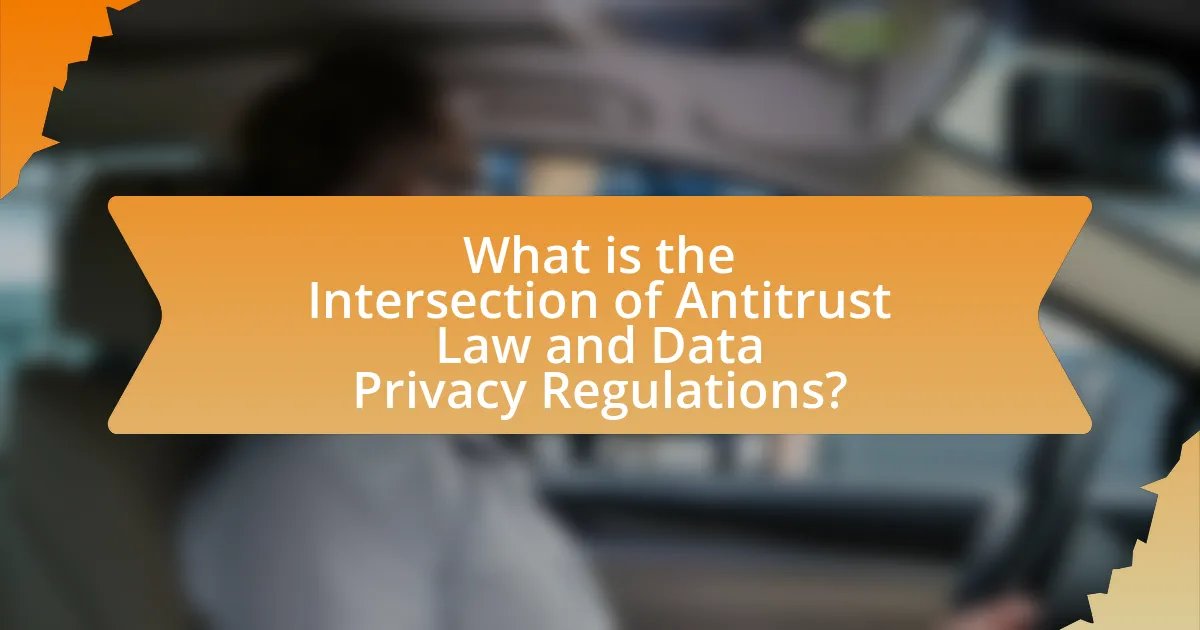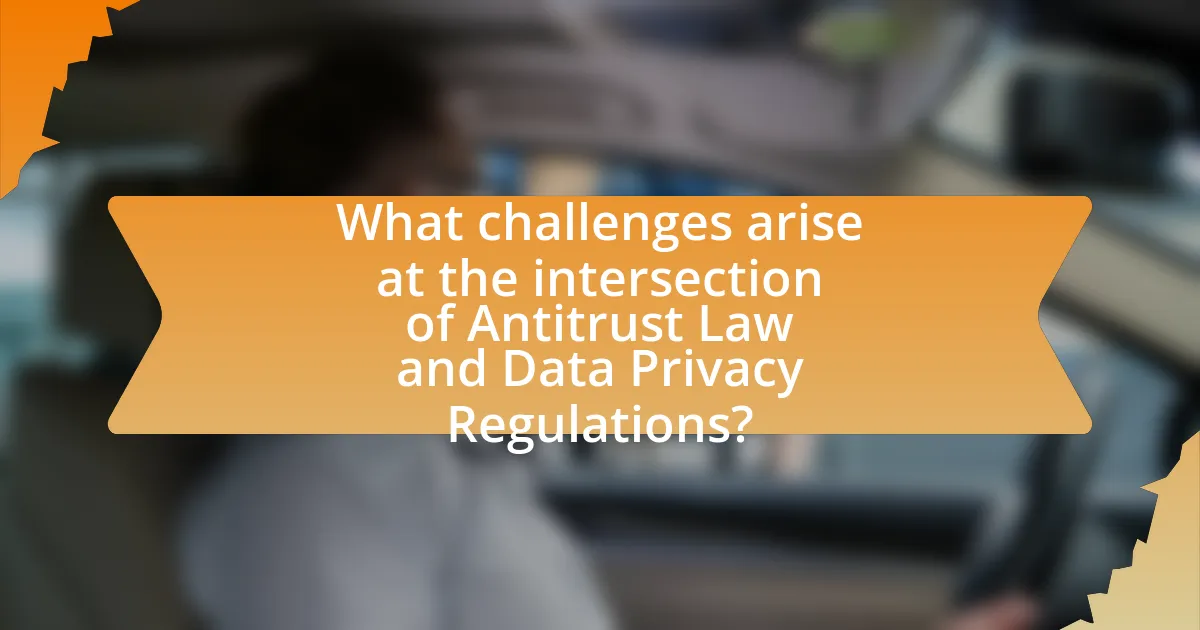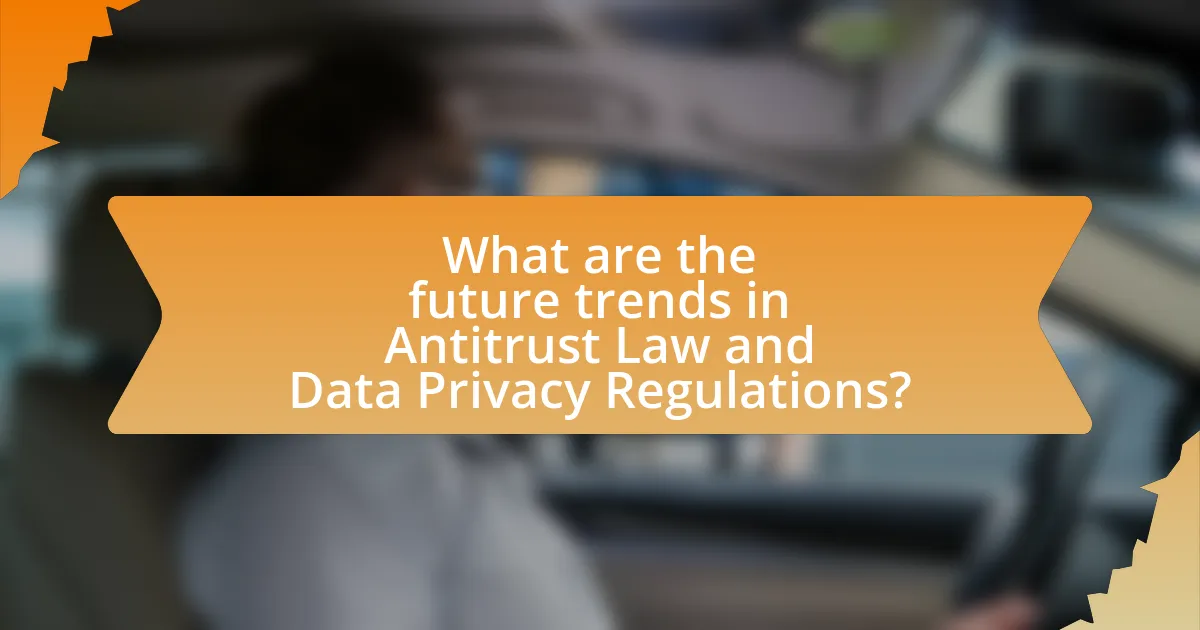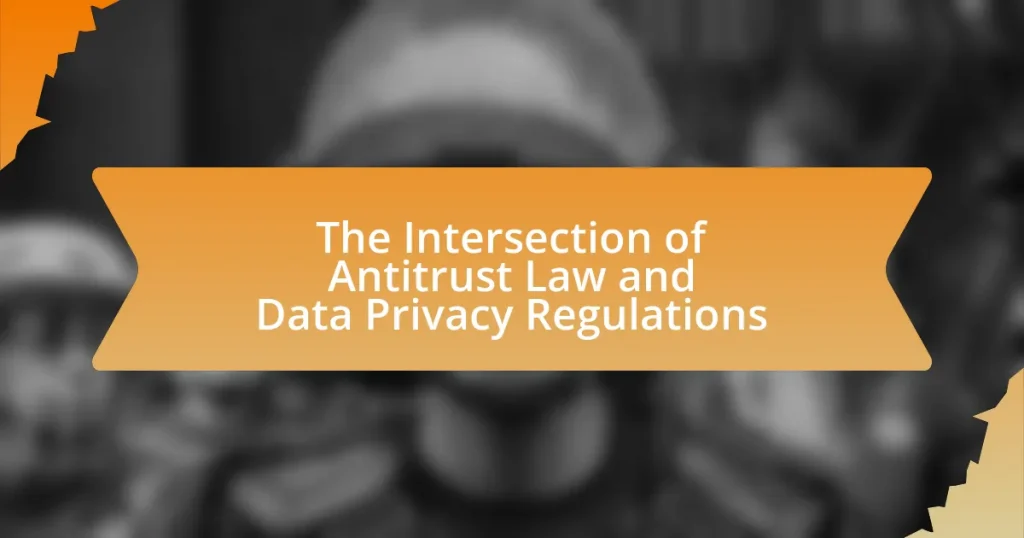The article examines the intersection of antitrust law and data privacy regulations, highlighting how these two legal frameworks interact to influence market competition and consumer protection. It discusses the principles of antitrust law, which aim to prevent monopolistic practices, alongside data privacy regulations that safeguard consumer information. Key components of both areas are analyzed, including compliance challenges businesses face in the digital landscape, the role of regulatory bodies, and recent enforcement trends. The article emphasizes the importance of navigating these regulations to maintain fair competition while protecting consumer rights, particularly in light of emerging technologies and evolving legal standards.

What is the Intersection of Antitrust Law and Data Privacy Regulations?
The intersection of antitrust law and data privacy regulations lies in the scrutiny of how companies collect, use, and share consumer data, which can impact market competition. Antitrust laws aim to prevent monopolistic practices and promote competition, while data privacy regulations focus on protecting consumer information and ensuring transparency in data handling. For instance, the European Union’s General Data Protection Regulation (GDPR) imposes strict rules on data processing, which can affect how companies compete by limiting their ability to leverage consumer data for competitive advantage. This dual focus highlights the need for businesses to navigate both legal frameworks to avoid penalties and maintain fair competition.
How do Antitrust Law and Data Privacy Regulations relate to each other?
Antitrust law and data privacy regulations are interconnected as both aim to promote fair competition and protect consumer interests. Antitrust laws prevent monopolistic practices and promote market competition, while data privacy regulations safeguard individuals’ personal information from misuse by companies. For instance, large tech firms that dominate the market may exploit user data, leading to potential violations of both antitrust and privacy laws. The European Union’s General Data Protection Regulation (GDPR) and the Digital Markets Act illustrate this relationship, as they address both competitive practices and data protection, emphasizing the need for companies to comply with both legal frameworks to ensure consumer rights and market fairness.
What are the fundamental principles of Antitrust Law?
The fundamental principles of Antitrust Law are to promote competition, prevent monopolies, and protect consumer welfare. These principles aim to ensure that markets operate efficiently and fairly, allowing consumers to benefit from lower prices and greater choices. For instance, the Sherman Act of 1890 prohibits contracts, combinations, or conspiracies that restrain trade, while the Clayton Act of 1914 addresses specific practices such as price discrimination and exclusive dealings that may harm competition. These laws are enforced by agencies like the Federal Trade Commission and the Department of Justice, which investigate and take action against anti-competitive practices to maintain a competitive marketplace.
What are the key components of Data Privacy Regulations?
The key components of Data Privacy Regulations include data protection principles, individual rights, compliance requirements, and enforcement mechanisms. Data protection principles, such as purpose limitation and data minimization, dictate how personal data should be collected and processed. Individual rights grant users control over their data, including rights to access, rectification, and erasure. Compliance requirements outline obligations for organizations, such as appointing data protection officers and conducting impact assessments. Enforcement mechanisms establish penalties for non-compliance, ensuring accountability through fines and legal actions, as seen in regulations like the General Data Protection Regulation (GDPR), which imposes significant fines for violations.
Why is the intersection of these two areas important?
The intersection of antitrust law and data privacy regulations is important because it addresses the balance between competition and consumer protection in the digital economy. This intersection ensures that companies do not engage in anti-competitive practices that could harm consumer privacy, such as monopolistic control over personal data. For instance, the European Union’s General Data Protection Regulation (GDPR) and the Digital Markets Act (DMA) work together to prevent large tech companies from abusing their market power while safeguarding user data. This regulatory synergy is crucial for fostering innovation, maintaining fair market practices, and protecting consumer rights in an increasingly data-driven landscape.
How do these regulations impact consumer rights?
Regulations in antitrust law and data privacy significantly enhance consumer rights by promoting fair competition and protecting personal information. These regulations ensure that consumers have access to a variety of choices in the marketplace, preventing monopolistic practices that can lead to inflated prices and reduced quality of goods and services. For instance, the Federal Trade Commission’s enforcement of antitrust laws aims to dismantle anti-competitive mergers and practices, thereby safeguarding consumer interests. Additionally, data privacy regulations, such as the General Data Protection Regulation (GDPR) in Europe, empower consumers by granting them control over their personal data, including the right to access, rectify, and delete their information. This dual approach not only fosters a competitive market but also reinforces consumer autonomy and security in their transactions.
What are the implications for businesses operating in the digital space?
Businesses operating in the digital space face significant implications related to compliance with antitrust laws and data privacy regulations. These regulations require companies to ensure fair competition while protecting consumer data, which can lead to increased operational costs and the need for robust legal frameworks. For instance, the European Union’s General Data Protection Regulation (GDPR) imposes strict data handling requirements, and non-compliance can result in fines up to 4% of annual global revenue. Additionally, antitrust scrutiny can limit mergers and acquisitions, impacting growth strategies. Therefore, businesses must navigate a complex landscape that balances competitive practices with stringent data protection mandates.

What challenges arise at the intersection of Antitrust Law and Data Privacy Regulations?
Challenges at the intersection of Antitrust Law and Data Privacy Regulations include conflicts between promoting competition and protecting consumer privacy. Antitrust Law aims to prevent monopolistic practices and ensure market competition, while Data Privacy Regulations focus on safeguarding personal information. For instance, companies may need to share data to comply with antitrust requirements, potentially violating privacy laws. Additionally, the enforcement of these laws can lead to uncertainty for businesses, as they navigate differing regulatory frameworks. This complexity is evident in cases like the European Union’s General Data Protection Regulation (GDPR) and its implications for competition policy, where companies face dilemmas in balancing compliance with both sets of regulations.
How do conflicting objectives create legal dilemmas?
Conflicting objectives create legal dilemmas by presenting situations where compliance with one legal framework may lead to violations of another. For instance, antitrust laws aim to promote competition and prevent monopolistic practices, while data privacy regulations focus on protecting individual privacy rights. When a company seeks to enhance its market position through data-driven strategies, it may inadvertently infringe upon privacy laws by collecting or using personal data without adequate consent. This tension between fostering competition and ensuring privacy compliance exemplifies how conflicting legal objectives can complicate decision-making for businesses, leading to potential legal repercussions.
What are the potential conflicts between competition and privacy?
Potential conflicts between competition and privacy arise when companies prioritize competitive advantages over consumer data protection. For instance, aggressive data collection practices can enhance market dominance but may infringe on individual privacy rights. A notable example is the tech industry, where firms like Facebook and Google leverage vast amounts of personal data to optimize advertising and user engagement, often leading to privacy concerns and regulatory scrutiny. The European Union’s General Data Protection Regulation (GDPR) exemplifies this tension, as it imposes strict data handling requirements that can limit companies’ ability to utilize data for competitive purposes, potentially stifling innovation and market competition.
How can companies navigate these legal challenges?
Companies can navigate legal challenges at the intersection of antitrust law and data privacy regulations by implementing comprehensive compliance programs that address both areas simultaneously. These programs should include regular audits to ensure adherence to antitrust laws, such as the Sherman Act, while also complying with data privacy regulations like the General Data Protection Regulation (GDPR). For instance, companies can establish clear data handling policies that promote transparency and consumer rights, which can mitigate risks associated with both antitrust scrutiny and privacy violations. Additionally, engaging legal experts who specialize in both fields can provide tailored strategies that align business practices with evolving legal standards, thereby reducing the likelihood of litigation and penalties.
What role do regulatory bodies play in this intersection?
Regulatory bodies play a crucial role in the intersection of antitrust law and data privacy regulations by enforcing compliance and ensuring fair competition while protecting consumer data. These bodies, such as the Federal Trade Commission (FTC) in the United States, monitor business practices to prevent anti-competitive behavior that could exploit consumer data. For instance, the FTC has taken action against companies that misuse personal information in ways that harm competition, demonstrating their commitment to both antitrust enforcement and data privacy. This dual focus helps maintain a balance between fostering innovation and safeguarding consumer rights in the digital marketplace.
How do different jurisdictions approach these regulations?
Different jurisdictions approach antitrust law and data privacy regulations with varying degrees of emphasis and frameworks. For instance, the European Union enforces stringent data privacy regulations through the General Data Protection Regulation (GDPR), which significantly impacts antitrust considerations by prioritizing consumer data protection. In contrast, the United States adopts a more fragmented approach, where federal and state laws coexist, leading to less uniformity in data privacy protections and antitrust enforcement. This divergence is evident in the U.S. Federal Trade Commission’s focus on consumer welfare in antitrust cases, which may not fully account for data privacy concerns, unlike the EU’s holistic approach that integrates both aspects.
What are the recent trends in enforcement actions?
Recent trends in enforcement actions indicate a significant increase in scrutiny over data privacy practices by regulatory bodies, particularly in the context of antitrust law. Regulatory agencies, such as the Federal Trade Commission (FTC) and the European Commission, have intensified their focus on how companies collect, use, and share consumer data, often linking these practices to competitive behavior. For instance, in 2022, the FTC launched multiple investigations into major tech companies for potential violations of both antitrust laws and data privacy regulations, highlighting a dual approach to enforcement. This trend reflects a growing recognition that data privacy issues can have substantial implications for market competition and consumer protection.

What are the future trends in Antitrust Law and Data Privacy Regulations?
Future trends in antitrust law and data privacy regulations indicate a growing emphasis on the intersection of competition and consumer protection. Regulatory bodies are increasingly scrutinizing large technology companies for anti-competitive practices while simultaneously addressing data privacy concerns. For instance, the European Union’s Digital Markets Act aims to ensure fair competition in digital markets, while the General Data Protection Regulation enforces strict data privacy standards. This dual focus reflects a broader global trend where jurisdictions are harmonizing antitrust and privacy laws to protect consumers and promote fair market practices. Additionally, the rise of artificial intelligence and big data analytics is prompting regulators to consider how these technologies impact competition and privacy, leading to more integrated regulatory frameworks.
How is technology influencing these legal frameworks?
Technology is significantly influencing legal frameworks by reshaping the landscape of antitrust law and data privacy regulations. The rise of digital platforms has led to increased scrutiny of monopolistic practices, as seen in cases against major tech companies like Google and Facebook, where their data collection practices raise concerns about consumer privacy and market competition. Furthermore, advancements in data analytics and artificial intelligence are prompting regulators to adapt existing laws to address new challenges, such as the need for transparency in algorithmic decision-making. This evolution is evidenced by the introduction of the General Data Protection Regulation (GDPR) in Europe, which imposes strict guidelines on data handling and has influenced similar legislative efforts globally.
What emerging technologies pose new challenges for compliance?
Emerging technologies such as artificial intelligence, blockchain, and the Internet of Things (IoT) pose new challenges for compliance. These technologies often operate in ways that can conflict with existing antitrust laws and data privacy regulations. For instance, artificial intelligence can lead to algorithmic bias, raising concerns about fairness and transparency in compliance with data protection laws. Blockchain’s decentralized nature complicates the enforcement of data privacy regulations, as it can be difficult to identify data controllers and processors. Additionally, IoT devices generate vast amounts of personal data, increasing the risk of non-compliance with data privacy standards. These challenges necessitate the development of new regulatory frameworks to effectively address the complexities introduced by these technologies.
How are policymakers adapting to technological advancements?
Policymakers are adapting to technological advancements by implementing updated regulations that address the complexities of digital markets and data privacy. For instance, the European Union’s General Data Protection Regulation (GDPR) exemplifies how lawmakers are responding to the challenges posed by data collection and user privacy in the digital age. Additionally, the U.S. has seen movements towards antitrust actions against major tech companies, reflecting a shift in regulatory focus to ensure fair competition and consumer protection in rapidly evolving technological landscapes. These adaptations are driven by the need to balance innovation with the safeguarding of public interests, as evidenced by ongoing discussions around the regulation of artificial intelligence and data usage.
What best practices can businesses adopt to comply with both regulations?
Businesses can adopt several best practices to comply with both antitrust laws and data privacy regulations. First, they should implement comprehensive compliance programs that include regular training for employees on both legal frameworks, ensuring that all staff understand the implications of their actions. Second, businesses should conduct regular audits of their data collection and processing activities to ensure transparency and adherence to privacy regulations while also evaluating competitive practices to avoid anti-competitive behavior. Third, establishing clear data governance policies that define how data is collected, used, and shared can help mitigate risks associated with both regulatory areas. Additionally, businesses should engage in proactive communication with regulators to clarify compliance expectations and seek guidance when necessary. These practices are supported by the fact that organizations with robust compliance frameworks are less likely to face legal challenges, as evidenced by studies showing that proactive compliance reduces the risk of fines and penalties.
How can companies implement effective data governance strategies?
Companies can implement effective data governance strategies by establishing clear policies, assigning data stewardship roles, and utilizing technology for data management. Clear policies define data ownership, access controls, and compliance requirements, ensuring that all employees understand their responsibilities regarding data handling. Assigning data stewardship roles involves designating individuals or teams responsible for overseeing data quality, security, and compliance, which fosters accountability. Utilizing technology, such as data management platforms and analytics tools, enables companies to automate data governance processes, monitor data usage, and ensure adherence to regulations. According to a 2021 report by Gartner, organizations with strong data governance frameworks can reduce data-related risks by up to 30%, demonstrating the effectiveness of these strategies.
What steps should businesses take to ensure compliance with both Antitrust and Data Privacy laws?
Businesses should implement a comprehensive compliance program that addresses both Antitrust and Data Privacy laws. This program should include conducting regular audits to assess compliance with relevant regulations, training employees on legal obligations, and establishing clear policies for data handling and competitive practices.
For instance, the Federal Trade Commission (FTC) emphasizes the importance of transparency in data collection and usage, which aligns with both data privacy and antitrust principles. Additionally, businesses should engage legal counsel to review practices and ensure alignment with evolving regulations, as seen in cases like the European Union’s General Data Protection Regulation (GDPR) and its implications for competition law.
By integrating these steps, businesses can mitigate risks associated with non-compliance and foster a culture of legal adherence.


